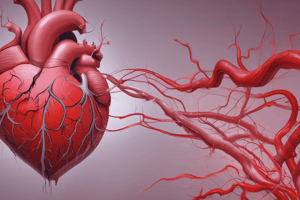Podcast
Questions and Answers
¿Qué síntomas pueden causar los ritmos cardíacos irregulares descritos en el texto?
¿Qué síntomas pueden causar los ritmos cardíacos irregulares descritos en el texto?
- Dolor abdominal y tos persistente
- Mareos y pérdida del conocimiento (correct)
- Fatiga y dolor en el pecho
- Palpitaciones y dolor de cabeza
¿Qué tipo de dispositivos implantables se mencionan en el texto como posibles opciones de tratamiento para trastornos cardíacos?
¿Qué tipo de dispositivos implantables se mencionan en el texto como posibles opciones de tratamiento para trastornos cardíacos?
- Bombas de insulina y tensiómetros
- Marcapasos y desfibriladores (correct)
- Brazalete de actividad y reloj inteligente
- Lentes de contacto y audífonos
¿Cuáles son factores de riesgo comunes tanto para los accidentes cerebrovasculares como para la enfermedad coronaria?
¿Cuáles son factores de riesgo comunes tanto para los accidentes cerebrovasculares como para la enfermedad coronaria?
- Colesterol bajo y obesidad
- Estrés crónico y falta de sueño
- Hiperactividad y bajo consumo de azúcar
- Hipertensión, tabaquismo, diabetes y obesidad (correct)
¿Qué método se menciona en el texto como tratamiento para un paciente que ha sufrido un accidente cerebrovascular utilizando fármacos que disuelven coágulos?
¿Qué método se menciona en el texto como tratamiento para un paciente que ha sufrido un accidente cerebrovascular utilizando fármacos que disuelven coágulos?
¿Cuál de las siguientes áreas se menciona como fuente de innovación en el campo de la cardiología según el texto?
¿Cuál de las siguientes áreas se menciona como fuente de innovación en el campo de la cardiología según el texto?
Flashcards are hidden until you start studying
Study Notes
Cardiovascular Diseases in Focus: An Exploration of Cardiology
Cardiology — the medical discipline dedicated to understanding, diagnosing, treating, and preventing heart disorders — plays a crucial role in our modern healthcare system. At its core lie the complexities and challenges posed by various forms of cardiovascular disease, which account for substantial morbidity and mortality worldwide. In this exploratory piece, we'll briefly delve into some key aspects associated with these conditions.
Cardiovascular diseases encompass a wide spectrum ranging from coronary artery disease, stroke, arrhythmias, congenital heart defects, peripheral arterial disease, and venous thromboembolism—all of which present unique diagnostic and therapeutic considerations. We begin by examining a few major players within this realm.
Coronary Artery Disease (CAD)
One of the most common health concerns globally is CAD, due, primarily, to the buildup of plaque in the coronary arteries. This process can block blood flow, ultimately leading to chest pain, myocardial infarctions, and even sudden death if untreated. Management strategies range from lifestyle modifications, medications like beta-blockers and statins, invasive procedures such as angioplasty and stenting, all the way to coronary artery bypass surgery when necessary.
Arrhythmias
Arrhythmias occur when the electrical activity controlling the heartbeat becomes uncoordinated or disordered. These irregular rhythms may cause symptoms such as palpitations or dizziness and, in more extreme cases, lead to syncope or sudden cardiac arrest. Treatment options vary depending upon the specific type and severity of the disorder; they might involve pharmacological interventions, catheter ablation, implantable devices like pacemakers and defibrillators, or surgical therapies.
Stroke
A stroke occurs when there is insufficient blood supply to part of the brain, resulting in damage to the affected area. Risk factors for strokes overlap significantly with those for CAD, including hypertension, smoking, diabetes, and obesity. When it comes to prevention, measures such as maintaining optimal blood pressure, exercising regularly, eating a balanced diet, and quitting tobacco usage play pivotal roles. If a patient suffers a stroke, treatments include intravenous thrombolysis using clot-dissolving drugs like alteplase, while mechanical methods like endovascular thrombectomy also prove effective under certain circumstances.
The field of cardiology holds immense promise for advancing treatment paradigms across many domains. Innovations in areas such as genomics, imaging modalities, wearable technology, device development, drug discovery, and personalized medicine hold tremendous potential for improving outcomes and reducing complications related to cardiovascular disease. As we continue to explore the ever-evolving landscape of cardiovascular care, one thing remains constant: staying informed, proactive, and engaged will serve us well in mitigating risks and achieving better overall health.
Studying That Suits You
Use AI to generate personalized quizzes and flashcards to suit your learning preferences.




